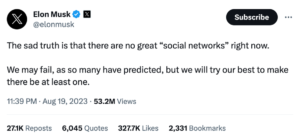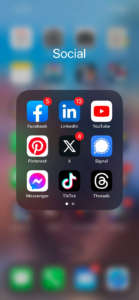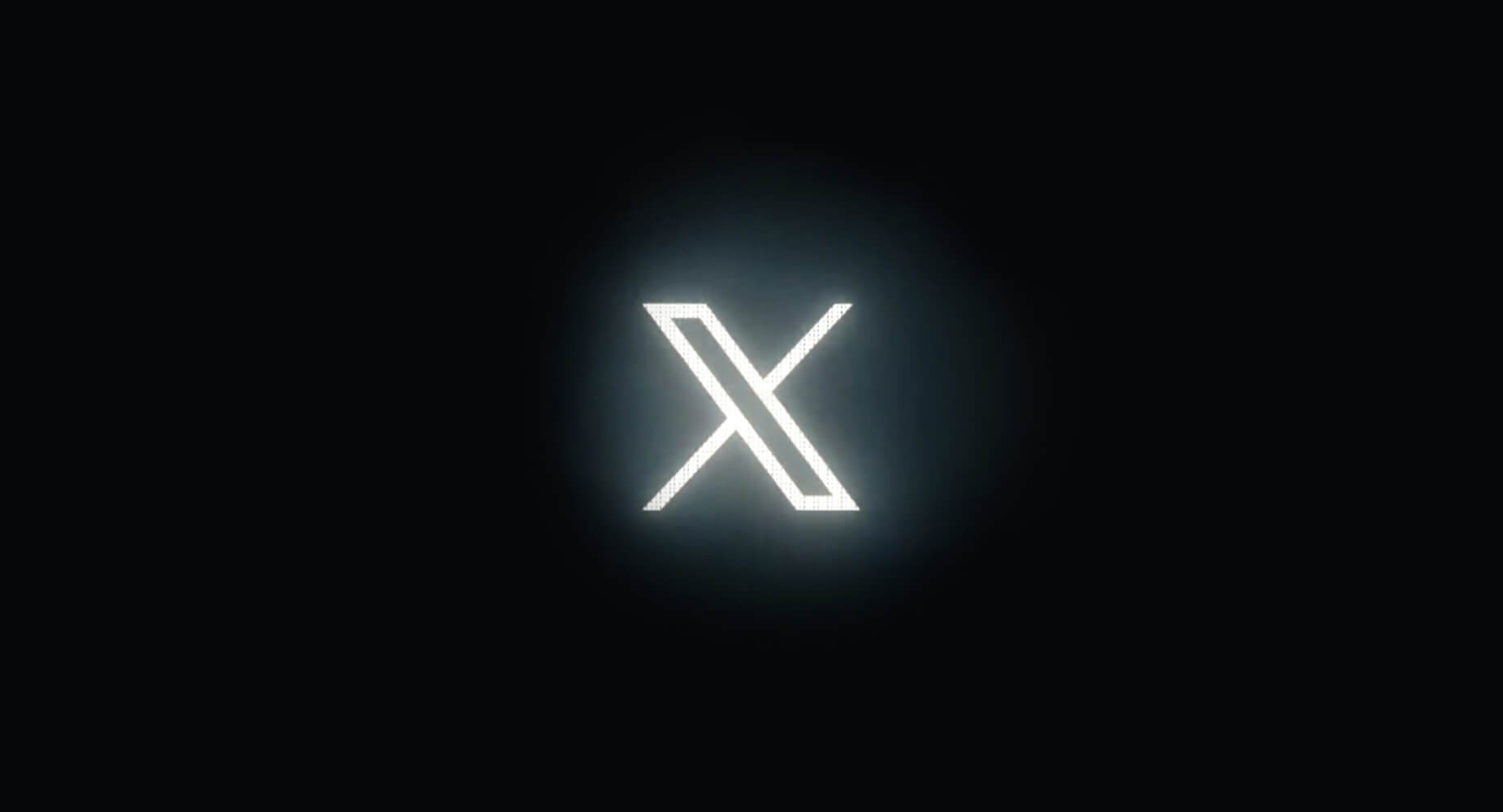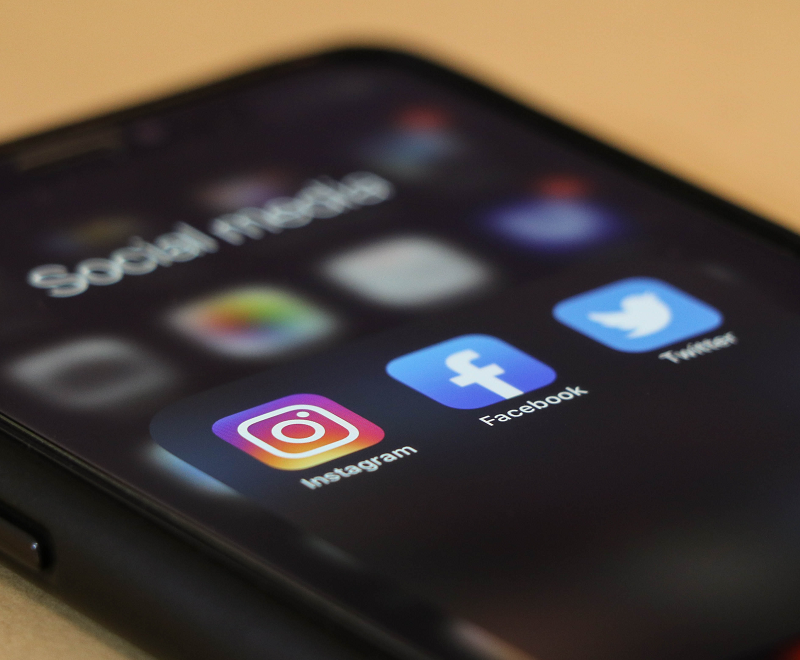After an eventful nine months in charge, Elon Musk has made his biggest change yet to the social media platform he acquired for $44bn.
After 17 years as Twitter, the social media platform will now be known as ‘X’.
This rebranding is the first stage of Musk’s plan for the platform to evolve into an ‘everything app’, similar to WeChat – the Chinese super-app providing text, voice and broadcast messaging, video conferencing, video games, mobile payment, photograph, video and location sharing.
On acquiring Twitter, Musk explained that he felt ‘it is important to the future of civilisation to have a common digital square.’
Clearly, there could be significant changes on the horizon at the social media platform – not least because of increased competition in the form of Threads – a Meta-launched text-based conversation app with an identical look and feel to Twitter.
So what does this mean for people looking to navigate the complex world of digital comms and social media strategy? Well, for now, not much. Although in rebranding Twitter, Musk has made the biggest strategic decision of his time in charge of the platform, we have only had the logo and name change: substantive editorial and user experience changes are a way off.
But the rebrand is most likely the opening salvo in what could be one of the biggest set of changes to social media in a long while – and Pagefield is here to help.
Over the coming months, we’ll be providing updates on this blog when substantive changes take place with X and its competitors. We’ll be looking at what the changes are, what they mean for people using the platform, and critically how they might impact on corporate and consumer communications, which rely heavily on social media. So stayed tuned, and get in touch if you’d like a deeper conversation on how Pagefield can support your digital communications.
**
Thursday 24th August: An article in Digiday has revealed that the referral traffic coming from links shared to X to publishers’ websites has declined sharply in the last year. A web publishing tech provider called Automattic has analysed a random set of 25 large and small publishers and found that traffic from X fell on average by 24% from the first half of 2022 to the first half of 2023. See below for the full breakdown:
BuzzFeed: ⬇️ 70%
Reuters: ⬇️ 67%
WP: ⬇️ 48%
WSJ: ⬇️ 42%
CNN: ⬇️ 41%
Fox News: ⬇️ 39%
NBC News: ⬇️ 38%
NYT: ⬇️ 35%
The Guardian: ⬇️ 29%
BBC News: ⬇️ 20%
This may be unsurprising given the recent report in The Washington Post which found that X was deliberately slowing the page load speed of links to news organisations like the New York Times and Reuters – publications considered more hostile to Musk and his plans for X. Whisper it, but there’s a hint of irony that despite Musk’s ultra-libertarian vision for X, certain publications deemed hostile or too liberal are now finding themselves deprioritised. If Musk wishes to reverse X’s recent fortunes, I’d maybe suggest not alienating news publications that he personally disagrees with. Just a thought.
*
Monday 21st August: Breaking news! The cracks are beginning to show. In a recent ‘tweet’ (does anyone even know what we call posts on X yet?) Musk slams all social networks and admits X might fail. In an uncharacteristically self-deprecating post, you could be forgiven for thinking the X-platform owner is almost feeling sorry for himself. We watch, we wait…

*
Sunday 20th August: Elon Musk is having to now contend with another glitch plaguing the platform now known as X. Users are reporting difficulties seeing old posts that came with images attached or any hyperlinks converted through Twitter/X’s built-in URL shortener. It appears to only affect tweets published prior to December 2014, meaning that viral selfie posted by Ellen DeGeneres at the Oscars alongside Bradley Cooper, Jennifer Lawrence and others is no longer available. How will we manage?
The recent string of issues at X has resulted in the company announcing it will bring back its “client council” to provide input into key ad policy decisions in the app. This will provide some of X’s biggest ad partners with the opportunity to raise any concerns that they may have about the platform under the direction of Musk and chief executive Linda Yaccarino. According to one article, X’s ad revenue is still down by around 50% since Musk’s purchased the company. Unless we’re missing something, we’re fairly certain the agenda for the client council’s first meeting back will not be short of updates.
*
Saturday 19th August: In a development that goes some way to support critics’ claims that all content moderation measures have by and large been abandoned at X, Elon Musk has announced plans to drop X’s blocking feature. Musk thinks the feature “makes no sense”, apparently. Currently, when users “block” an account, it stops that account’s posts from appearing in the blocker’s timeline, and vice versa. It should go without saying that blocking features on social media platforms help protect users from harassment, abuse or stalking. While Musk has said that X users will be still be able to block people from directly messaging them, it’s entirely possible that plans to remove the blocking feature will be thwarted altogether. This is because doing so could violate the terms and conditions of stores like Apple’s App Store and Google’s Android equivalent, the Play Store. At least some tech companies appear to have our best interests at heart.
*
Friday 11th August: In our last update, we said X was going all in on video. Well, it now appears that video calls are the next step for the ‘everything app’. Notably, X plans to launch the feature which would enable users to ring one another without providing a phone number. Musk’s vision of X evolving into something resembling China’s WeChat is slowly but surely being realised. Whether its users or not buy in remains to be seen, time will tell…
*
Wednesday 9th August: When Threads first launched, there were a number of brands, organisations and celebrities threatening to withdraw from Twitter for good. However, many of these threats have proved to be empty. Despite this, Australia’s public broadcaster, ABC, has announced that it is shutting down almost of all of its accounts on Musk’s platforms. ABC cited “toxic interactions”, cost and better interaction with ABC content on other social media platforms. The broadcaster will keep four of its accounts, though, including @abcnews, @abcsport, @abcchinese and the master @abcaustralia account.
ABC’s managing director, Steve Anderson, explained that the vast majority of the broadcaster’s social media audience was located on official sites on YouTube, Facebook, Instagram and TikTok. “We want to focus our effort and resources on where our audiences are,” he said. The social media accounts of news organisations have long been ripe for toxic and conflict-ridden discourse, largely due to opposing political factions viewing the replies section as their chosen battleground. Whether more news organisations follow ABC’s lead remains to be seen. If more do, though, it will only serve to weaken Musk’s plans for X to establish itself as the world’s global digital town square.
*
Monday 7th August: A longer update this time around… They might be happening in the background, but changes to the artist formerly known as Twitter are underway. The algorithm is being updated regularly and X is now looking to amplify replies to posts, with replies to content getting more exposure than retweets in the platform’s main ‘For You’ feed.
So, why is this happening? Remember all those advertisers fleeing the platform after Musk took over, eventually leading to him offering 50% discounts on advertising space? Well, it seems as though replies are a key component of X’s ad revenue share strategy, with creators getting a share of the ad intake from ads shown in the reply stream.
Musk highlighted enhanced video capabilities on the platform at the centre of his pitch for X. A live video feature has been introduced and users can even download video content from the platform. By encouraging more people to consume video content on the app, X can start to monetise the content by inserting ads and generating more revenue share options for video creators.
Beyond videos, X is also evolving and expanding its verification packages. While blue ticks held a bit more prestige before you could simply buy one, what about a gold tick…? X has announced its Verification for Organisations programme will receive an upgrade to further entice brands to pay $100 for the coveted gold tick. The perks include priority exposure and premium support, the latter also being a key offering of Meta’s verification package.
There’s more good news for companies and large organisations too. X has recently started promoting its new on-profile job listings feature, meaning some brands in the US will now be able to advertise job openings on their company profile. LinkedIn, watch your back!
And speaking of LinkedIn… X is potentially borrowing some more functionality from that platform. According to some UX designers at X, there will soon be a new option to sort a profile’s posts by: ‘Most recent’, ‘Most liked’ and ‘Most engaged with’. X is yet to confirm a launch date for this new feature, but this update could improve overall activity on the platform by making sure the most engaging content gets in front of users. Stay tuned, dear reader, no doubt there will be more to come from X soon….
*
Monday 31st July: The X sign (reminder: erected only three days ago atop the company’s HQ) has now been removed by City officials in San Francisco. They said they were investigating the sign’s installation after numerous complaints. We did wonder which would fall first – the sign or the platform…
*
Sunday 30th July: Kanye West, former Kardashian family spouse and once widely acclaimed rapper and producer, has been reinstated on X after an almost eight-month ban. West, known these days as Ye, was accused of violating the platform’s rules prohibiting incitement to violence. X seems set to opens its arms to a whole host of controversial keyboard warriors who had previously violated the social media app’s rules. Trump next? Time will tell.
*
Saturday 29th July: As the battle of Silicon Valley tech bros heats up, Apple initially announced that it couldn’t accept the new name for Twitter’s iOS app because of its minimum character requirements… Apple may claim that its App Store doesn’t permit any app to have a single character as its name, but interpreting this as an attempt to clip Musk’s wings doesn’t seem too farfetched either. Update: Apple found a way to make it work.
*

Wednesday 26th July: X Corp has reportedly extended an olive branch to advertisers who had flocked from the social network by offering reductions on its advertising prices by as much as 50%. Musk is understood to be offering incentives on certain ad formats in the US and the UK. X Corp is said to have offered pricing on video adverts that run alongside a list of trending topics in its ‘Explore’ tab which would give brands 24 hours on top of the popular section.




